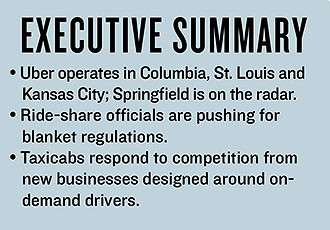
Kyle Butrick: Uber can undercut taxi prices with less regulation.
City of Springfield rule changes for Uber are on hold. But a bill running through the General Assembly in Jefferson City is a different matter.
For Kyle Butrick, both proposals are troubling.
Butrick owns Springfield Yellow Cab Co. Inc., a taxi service with a 100-vehicle fleet serving the area the last 65 years. He said the proposed city and state regulations treat ride-sharing businesses differently than taxi services. Also known as transportation network companies, app-based ventures such as Uber and Lyft successfully have entered markets nationwide with the help of lawmakers slashing the everyday red tape taxi services face.
“Ride-sharing? You can call it what you want. They’re taxicabs,” Butrick said.
Among the regulations Butrick’s company faces, drivers must secure Class E chauffer’s licenses and pass criminal background checks. He spends about $100 per car – some $10,000 a year – to meet local and state requirements, such as vehicle and taximeter inspections.
“Common sense would ask, why are they able to operate so much cheaper than we can?” Butrick said. “They’re just trying to undercut the competition. You’d be a fool not to use their service if you got a half rate on it.”
State Rep. Kirk Mathews, R-Pacific, views the business models differently.
Through House Committee Substitute House Bill 2330, Mathews suggests regulating TNCs with such provisions as displaying pictures of the driver and license plate numbers on the apps or websites; disclosing fare calculation methods; completing driver background checks; and requiring proof of automobile insurance. The bill could be up for debate on the House floor this week.
The proposed city of Springfield ordinance, which City Council tabled by a 7-2 vote March 21, would have required drivers for Uber and other companies complete a criminal background check, be 21 years old – instead of 19 under the state proposal – and receive a permit from the director of finance. Uber Missouri General Manager Sagar Shah told Springfield officials at the meeting the city’s rules would keep San Francisco-based Uber from entering the market.
Shah said Springfield’s unfavorable proposal places the burden of responsibility on the individual drivers to carry out the law. The Uber-preferred state regulations ask the company to fulfill the requirements, something it’s already doing in 28 other states.
“Uber creates a marketplace,” Shah said, noting drivers are part-timers who work around 10 hours a week.
The model trumpets the claim rules designed to regulate professional drivers don’t fit.
“The system really depends on a lot of people doing a little bit at a given time,” Shah said. “When you have a model like this, it becomes incredibly important to put the burden of regulation on the company rather than the individual drivers.”
Mathews said his legislation, modeled after other states, is needed to help forward Uber’s plans to add 10,000 driver jobs in the Show-Me State. The company operates in Kansas City, St. Louis and Columbia, and Uber is pursuing entry in Springfield, Jefferson City, St. Charles and St. Joseph.
“There are different regulations in each municipality,” Mathews said. “So, a statewide platform for these companies, I think, is really important. It’s a tremendous opportunity to start a small business using a depreciating asset that sits in their garage in their free time.”
Through negotiations with taxicab companies across the state, an amendment was added to Mathews’ bill in March to allow taxi businesses to choose, in any given year, under which business model they’d be regulated. That could make the TNC model more attractive for some cab services, but compliance also could require investments, such as creating an app and website with available driver information. The amendment was designed to address concerns by ABC Cab Co., the St. Louis Metropolitan Taxicab Commission, the city of Kansas City and the Missouri Municipal League.
Dave Sutton, a spokesman for Who’s Driving You?, a Maryland-based safety advocate funded by the Taxicab Limousine & Paratransit Association, isn’t sold on Mathews’ proposal. Sutton said ride-sharing companies routinely cut corners when it comes to protecting riders, claiming TNCs often don’t require drivers provide fingerprints for background checks conducted by law enforcement.
Fingerprints were required as part of criminal background checks in the Springfield regulations council tabled for further consideration. At the meeting, Shah acknowledged Uber did not require fingerprints from drivers but said the company worked to ensure all customers were safe through its own vetting process.
“Their business investment is undercutting public safety,” Sutton said. “We are seeing instances of Uber passengers physically assaulted by drivers all across the country.”
He pointed to a November report by KSHB TV in Kansas City citing seven instances of sexual assault involving ride-sharing companies in the city the last year.
Sutton said insurance gaps need to be addressed in the ride-sharing space, as well. For example, he said if a driver asks a client to call next time they need a ride instead of using the app, and then an accident occurs, those damages are likely to be denied because no official company transaction took place. In the taxi industry, those vehicles would be covered, Sutton said.
Shah said on March 30 Uber has $1 million worth of casualty insurance on its drivers, each route is tracked by GPS, riders receive a picture of each driver and license plate number, and there are no cash transactions since riders pay through the app.
Butrick said it was too soon to know just how Uber and companies like it might impact his business, but on any Friday and Saturday night, Springfield Yellow Cab will have about 75 drivers on the road serving the bar crowd. Opponents say demand for that many drivers is threatened by ride-sharing options.
“It’s going to cut into it quite a bit,” Butrick said. “I hope Uber is like foosball, and we can all say before long it was just a phase.”
